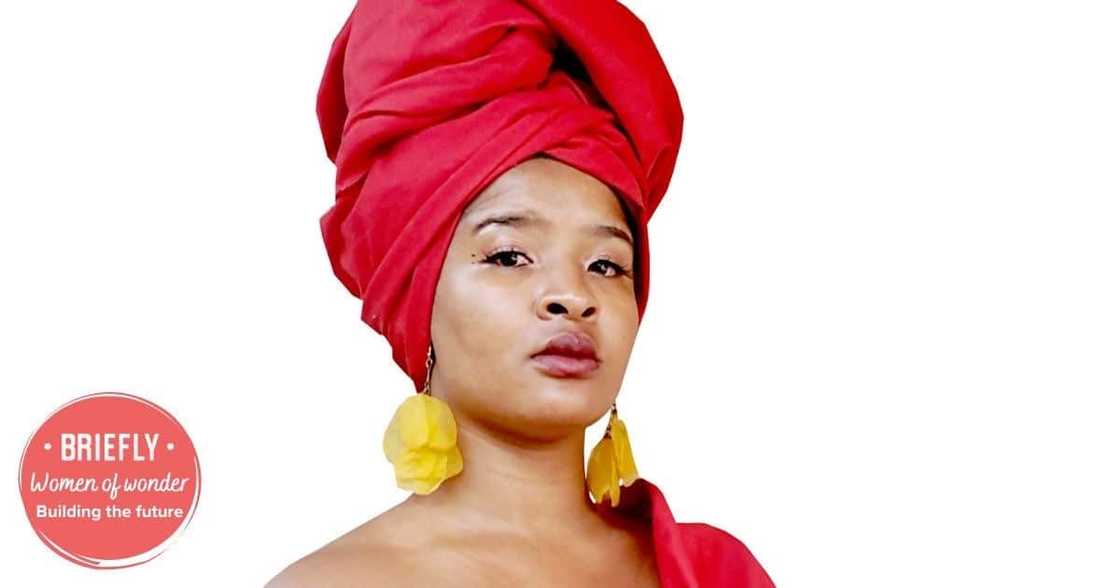Empowering Change: How Kgaugelo Lekalakala Defied Norms and Revolutionised Construction as a Woman Architect
- Meet Kgaugelo Lekalakala, the empowering architect challenging norms, shattering ceilings and sparking change in the male-dominated construction industry
- Lekalakala is a young architect and artist who explores the black body in space using paintings, graphics and architecture to critique spatial constructs
- In honour of Women’s Month, Lekalakala features as part of Briefly News’ Women of Wonder: Building the Future project
PAY ATTENTION: Let yourself be inspired by real people who go beyond the ordinary! Subscribe and watch our new shows on Briefly TV Life now!
With towering cranes and steel structures, the construction industry is seen as a "man’s world". But one woman is emerging as a beacon of change.

Source: UGC
Meet Kgaugelo Lekalakala, a powerhouse architect who has challenged norms, shattered glass ceilings and brought change to an industry caught up in tradition.
Hailing from Mmametlhake, a rural village in Mpumalanga, Lekalakala’s journey from underdeveloped surroundings to architectural innovation is a tale of determination and empowerment.

Read also
Thuli Madonsela makes South Africans proud after United Nations appointment: “You have heavy lifting to do”
Challenging gender norms in the male-dominated construction industry
Sometimes when we decide what to do, we should look at what we need and what the world does. That’s what inspired Kgaugelo Lekalakala to go into architecture.
PAY ATTENTION: Click “See First” under the “Following” tab to see Briefly News on your News Feed!
What started as a passion for art quickly became a career, paving the way for other black women. In 2012, Lekalakala’s studied at the National School of the Arts, where she specialised in sculpting, ceramics, painting and design and broadened her medium into architecture.
She obtained her bachelor’s degree at the University of Cape Town four years later.
Lekalakala continued her studies and graduated with an MTech Arch (Prof) (CW) from the Graduate School of Architecture at the University of Johannesburg in 2019.
She has achieved other accolades, such as being published in City Journal: Tales of the Vulnerability of African Black Women in Transit Spaces (April 2020), the Funambulist Magazine on The Game-Changing Architecture Graduates (September 2020) and Design Studio Vol. 3: Designs on History - Apartheid’s Architects (2021) by Lesley Lokko.

Read also
Mpumalanga educator with passion for interior decor makes beautiful furniture and headboards by hand
Her upbringing sparked Lekalakala’s interest in architecture. The inspiring woman hailed from a background where the built environment is underdeveloped and access to infrastructure that provides essential services is limited.
She told Briefly News:
“This made me question if black spaces are stuck in a phase of constant under-development and growth is limited, especially regarding infrastructure.“
The limitations on black spaces were not the only thing that motivated Lekalakala to venture into construction. She decided to challenge the gender norms embedded in the male-dominated construction industry.
Her conviction wasn’t just for herself but for the young black women who lacked the belief and access to such opportunities.
“It was almost a need for me to persue architecture and become an archcitect.”
Representation of black women in construction is crucial
As a woman in construction, Lekalakala brings to the table an array of strengths and perspectives that illuminate her projects with creativity and excellence.
Drawing from her background, character and dedication, she navigates the industry with a resolve that challenges traditional constructs.
Addressing the need for gender diversity in construction, Lekalakala emphasises the power of representation. She envisions a transformed industry where women, especially those in leadership positions, create cultural shifts that ripple from the top down.
Through such inclusivity, young girls in high school can witness possibilities and be inspired to pursue their passions fearlessly.
Lekalakala challenges biases and champions collaboration in male-dominated industries
Many male-dominated industries have a patriarchal mindset, leading to women’s expertise being questioned and their opinions sidelined.
It’s not easy being an agent of change, but Lekalakala believes that exceptional work, combined with confidence in her craft, ultimately dismantles biases and paves the way for recognition.
“It allows people to give you credit for your work even though they have preconceived biases about who you are and where you come from.
"To an extent, your talent and work will speak for itself. It is a reality that industries are not very inclusive and one does not want their work to be questioned on top of the biases, therefore one has to ensure their work is exceptional,” she explained.
With determination and dedication to rewriting narratives, Lekalakala is changing misconceptions and stereotypes about women in construction. She stands against the objectification and harassment that sometimes plague the industry, asserting that femininity is not a weakness to be exploited but a strength to be celebrated.
Lekalakala believes men and women can work together in the industry, valuing each other’s expertise. In her collaborative approach, Lekalakala champions teamwork over competition.
She believes that different perspectives and experiences can converge to craft exceptional work that defies preconceived notions. Lekalakala’s conviction is rooted in the belief that collaboration drives innovation, bringing the industry closer to a future where diverse voices harmonise to shape a better world.
Lekalakala’s triumph at La Biennale International Exhibition
One of Lekalakala’s recent achievements was showcasing her work earlier this year in Italy at the La Biennale International Exhibition, curated by her role model Lesly Lokko.
The exhibition is still showing and it demonstrates the transformative potential of construction. Surrounded by many international talents, Lekalakala was empowered by the realisation that black women have a place at the forefront of architecture.
This exposure reassured her that her journey resonates with other young black women in Mzansi.
In honour of Women’s Day, Lekalakala told Briefly News that Lesley Lokko inspired her throughout her career.
Lokko is a Ghanaian-Scottish architect, educator and novelist. Lekalakala said Lokko re-shaped what architecture is and what it means:
“She is the first black woman that I have seen in a lot of leadership positions in the architectural space.
“She is a professor, dean, novelist, founder and director of AFI and many more she was recently the first person of African descent to have curated the Venice Architecture Biennale.
"She gave Africans a chance to show their talents and works, allowing them a seat at the table. This speaks a lot about access and representation.”
"Be the representation that others need to fuel their aspirations"
Reflecting on her journey, Kgaugelo Lekalakala gave her younger self advice:
"Even if spaces are hostile because you are black and female, ensure that you do not reduce your capabilities and how you value yourself. Let your work speak for you, you did not ask for permission to be in the industry, you earned it and you deserve to be there. Believe in yourself enough to be the representation that another black woman needs to entice them into being in the industry and pursuing a career in architecture."
Her words resonate as a mantra for young women entering a rapidly transforming world still embracing its biases.
Hammanskraal woman shares progress of 5-bedroom house for mom that she has been building for 4 years
Briefly News previously reported on another inspiring young woman who showed off the construction progress on the home she’s building for her mother.
Kagiso Majatladi posted about the progress made on the nearly-completed abode on social media, explaining that her mother would go from living in a three-roomed shack to a five-bedroom home.
She captioned the post:
"I started building the house in 2018 when I got a permanent job. Every month, I made sure there was a certain amount from my salary to buy material. It took me more than four years to get where I am today.”
PAY ATTENTION: Сheck out news that is picked exactly for YOU ➡️ click on “Recommended for you” and enjoy!
Source: Briefly News





